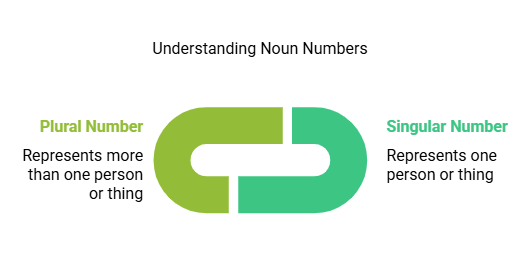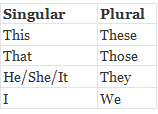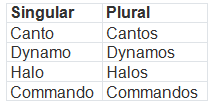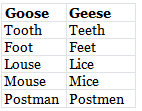Class 6 Exam > Class 6 Notes > English Grammar for Class 6 > The Noun: Numbers
The Noun: Numbers | English Grammar for Class 6 PDF Download
Nouns have two numbers: The Singular number and the Plural number.
The word - number - refers to whether a noun is only one or more than one.
Singular Number
A noun is said to be in the singular number when it is used to mean one person or thing:- baby, toy, life, child, man, girl, doll, bus, mango etc.
Plural Number
A noun is said to be in the plural number when it is used to mean more than one person or thing:- babies, toys, lives, children, men, girls, dolls, buses, mangoes, etc.
(i) Countable Nouns
- Countable Nouns are the things we can count; as, pens, books, bags, chairs, tables, apples, benches, etc.
- A singular countable noun always takes a or an before it.
- We can use a countable noun in the singular and also in the plural; as, This is a pen. These are pens. That is an apple. Those are apples.
(ii) Uncountable Nouns
- Uncountable Nouns are the things we cannot count; as, butter, ghee, honey, tea, wool, air, water, milk, oil etc.
- We never use a or an before an uncountable noun and we don’t use an uncountable noun in the plural; as, we can say two pens but we can’t say two water.
- We can use some with an uncountable noun. We can use some with a countable noun in the plural; as, Please give me some biscuits. Please give me some milk.
Rules for the Change of Numbers
The nouns which end in ‘s’ or ‘es’ in the plural form are regular plurals. The regular plurals are formed in the following ways:
- By adding the letter ‘s’ to the noun in singular;
apple – apples,
bag – bags,
cat – cats, etc. - Nouns ending in s, ss, sh, ch, x or z form their plurals by adding – ‘es’ to the singular;
bush – bushes,
bus – buses,
glass – glasses, etc. - If a Singular Noun ends in y with a vowel before it, the plural is formed by adding s only;
Boy – Boys,
Bay – Bays,
Chimney – Chimneys,
Donkey – Donkeys, etc. - If the Singular Noun ends in f or fe the plural is formed by changing f or fe into v and then adding es;
Calf – Calves,
Elf – Elves,
Half – Halves,
Knife – Knives, etc.

Rules for Making Plural Nouns
Consider the following rules while making a singular noun to plural.
- If a Singular Noun ends in y and there is a consonant before y the plural is formed by changing y into i and adding es;
Army – Armies,
Assembly – Assemblies,
Baby – Babies, etc. - Similarly, we can change the following: Country, city, cry, copy, dairy, diary, duty, enemy, fairy, fly, fury, gallery, gully, history, hobby, lady, lorry, lilly, luxury, penny, pony, policy, sky, story, victory.
- If the Singular Noun ends in ief, ff, ef, or f then the plural is formed by adding s to them;
Belief – Beliefs,
Chief – Chiefs,
Cliff – Cliffs,
Dwarf – Dwarfs, etc. - Similarly, we can do for the following: Handkerchief, hoof, mischief, gulf, grief, proof, roof, safe, serf, staff, strife, brief, etc.

1. Irregular Plural
- The nouns which do not form their plurals by adding s or es are called irregular plurals.

2. Plural of Compound Nouns
- If the Compound Noun is made of two nouns, the second noun is changed into the Plural Form;
Foot-man: Foot-men,
Governor-General: Governor- Generals,
Step-son: Step-sons,
Step-daughter: Step-daughters,
Gentle-man: Gentle-men,
Maid-Servant: Maid Servants, etc.
The document The Noun: Numbers | English Grammar for Class 6 is a part of the Class 6 Course English Grammar for Class 6.
All you need of Class 6 at this link: Class 6
|
49 videos|349 docs|46 tests
|
FAQs on The Noun: Numbers - English Grammar for Class 6
| 1. What are numbers used for in everyday life? |  |
Ans. Numbers are used in everyday life for a variety of purposes, such as counting, measuring, calculating, and keeping track of quantities or values. They are essential for tasks like shopping, budgeting, cooking, and telling time.
| 2. How do numbers help us understand quantities and measurements? |  |
Ans. Numbers provide a way to quantify and measure different aspects of the world around us. They allow us to understand and compare quantities, sizes, distances, weights, and many other physical attributes. For example, numbers help us determine the length of an object, the volume of a liquid, or the temperature of a room.
| 3. How do numbers play a role in mathematical calculations? |  |
Ans. Numbers are the foundation of mathematical calculations. They enable us to perform operations like addition, subtraction, multiplication, and division. With numbers, we can solve complex equations, calculate percentages, find averages, and analyze data. Mathematical calculations rely heavily on numbers to provide accurate and precise results.
| 4. What is the significance of numbers in financial management? |  |
Ans. Numbers play a crucial role in financial management. They help in budgeting, tracking expenses, calculating profits or losses, determining interest rates, and making informed financial decisions. Numbers allow individuals and businesses to monitor their financial health, plan for the future, and evaluate the performance of investments or savings.
| 5. How are numbers important in the field of statistics? |  |
Ans. Numbers are fundamental in statistics as they are used to represent and analyze data. Statistical techniques involve collecting, organizing, and interpreting numerical information to make meaningful conclusions. Numbers help in calculating measures of central tendency, variability, correlation, and significance. They enable statisticians to draw accurate conclusions and make informed predictions based on data analysis.
Related Searches
















